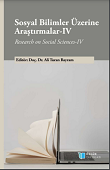Yerel Halkın Ekoturizm Algısı: Kilis İli Örneği
Ecotourism Perception of Local People's: The Example of Kilis Province
Author(s): Melda Akbaba, Ebru Mercandağı
Subject(s): Human Ecology, Rural and urban sociology, Economic development, Environmental interactions, Tourism
Published by: Özgür Yayın Dağıtım Ltd. Şti.
Keywords: Ecotourism; Province; business; rural areas; cities; environment;
Summary/Abstract: As a result of large-scale migration waves from rural areas to cities with the industrial revolution, people forced to live indoors and the intense pace of business life has affected people negatively. For this reason, people have started to tend towards areas where they can relax and have a pleasant time in their spare time. In addition, the preference of people to go to well-known destinations, especially on holidays, has led to the formation of overcrowding in these destinations. Accordingly, due to mass tourism, the carrying capacity of destinations with tourism potential has been exceeded and the environment has been damaged, and the concept of sustainability has emerged depending on the awareness of the pressure on the environment. This situation has shown its effect on the emergence of the concept of ecotourism. Ecotourism contributes to the protection of the natural and cultural environment, to transfer the cultural heritage to future generations, to ensure the continuity of biodiversity, to increase the welfare of the local people, to increase social relations, and to both countries and local people economically. In this context, the perception of the local people about ecotourism is important. At this point, the development of ecotourism is directly proportional to the perception of the local people. The aim of this study is to measure the ecotourism perception of the people living in Kilis city center. For this purpose, face-to-face interviews were conducted with 15 people. This study was designed as a qualitative research. The interview was examined by making suggestions for the answers given by the participants to the questions.
Book: Sosyal Bilimler Üzerine Araştırmalar - IV
- Page Range: 185-200
- Page Count: 16
- Publication Year: 2023
- Language: Turkish
- Content File-PDF

